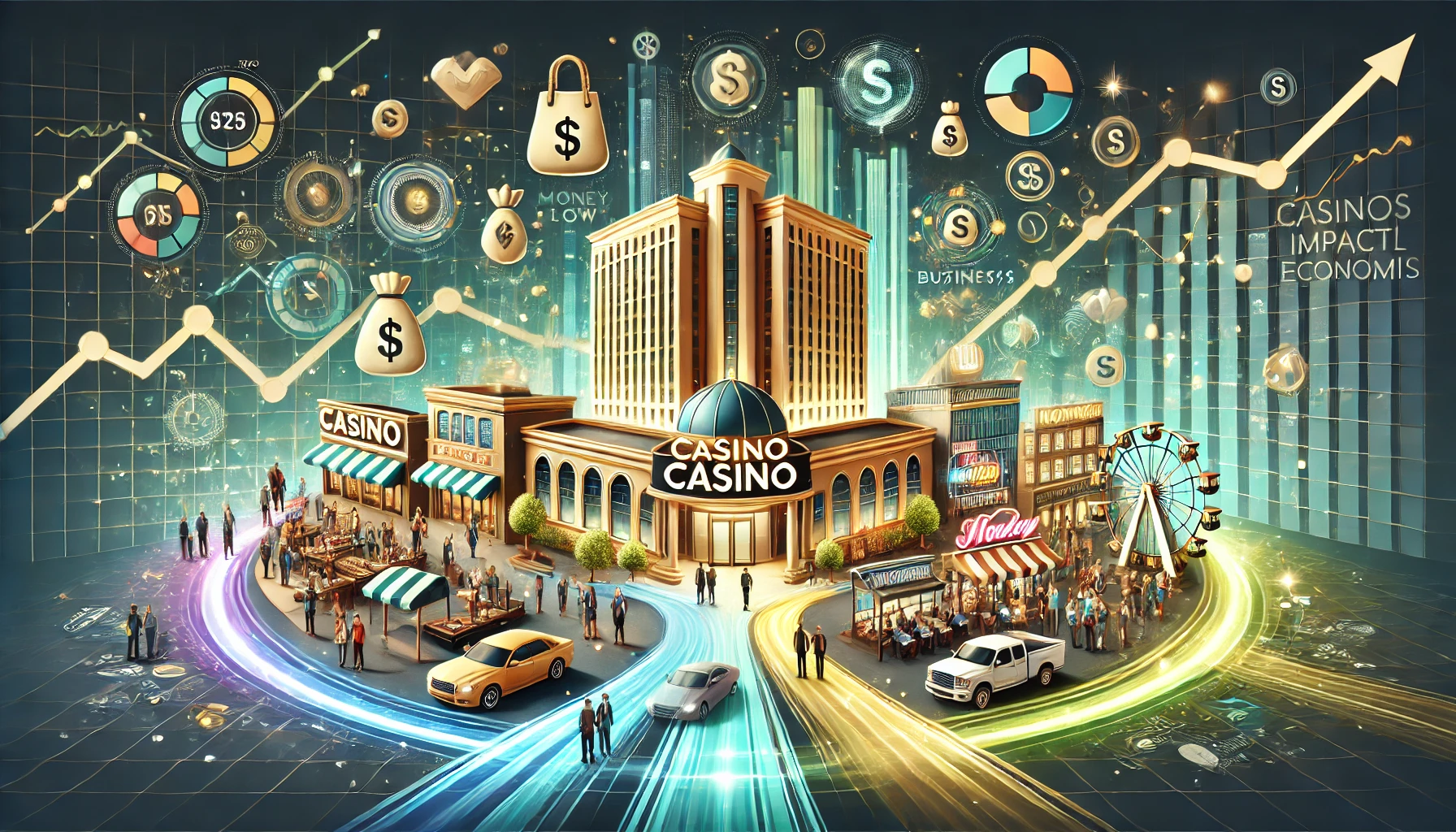
Introduction
Casinos are often seen as glittering hubs of entertainment, offering everything from slot machines and table games to live shows and luxury accommodations. But beyond the flashing lights and high-stakes games, casinos play a significant role in shaping the local economy. Their presence can bring both opportunities and challenges to surrounding communities. In this article, we’ll explore how casinos impact local economies, examining both the positive contributions and potential downsides.
1. Economic Benefits of Casinos
Job Creation and Employment Opportunities
One of the most immediate benefits casinos bring to local communities is the creation of jobs.
- Direct Employment: Casinos employ a wide range of workers, including dealers, security staff, hospitality workers, entertainers, and administrative personnel.
- Indirect Employment: The presence of a casino can boost local businesses such as restaurants, hotels, transportation services, and retail shops.
- Construction Jobs: Building and expanding casino properties create temporary construction and infrastructure jobs.
Example: In areas like Las Vegas and Macau, casinos are major employers and key drivers of local employment.
Increased Tax Revenue
Casinos contribute substantial tax revenue to local and state governments.
- Gaming Taxes: Governments collect taxes from casino revenues, which can be used to fund public services.
- Property Taxes: Casinos also pay property taxes, benefiting municipal budgets.
- Tourism Taxes: Additional taxes on hotels, dining, and entertainment indirectly benefit from casino-driven tourism.
Example: In states like Nevada and New Jersey, gaming taxes fund education, infrastructure, and social programs.
Boost to Local Businesses and Tourism
Casinos attract tourists, which in turn benefits local businesses.
- Tourist Spending: Visitors spend money on hotels, restaurants, shopping, and entertainment.
- Business Growth: Small businesses near casinos often see increased customer traffic.
- Event Hosting: Casinos often serve as venues for concerts, conventions, and special events, bringing even more visitors.
Example: The Foxwoods Resort Casino in Connecticut has significantly boosted tourism and hospitality industries in the region.
Infrastructure Development
The establishment of a casino often leads to improvements in local infrastructure.
- Transportation: Roads, airports, and public transit systems are expanded to accommodate visitors.
- Public Facilities: Increased tax revenues can lead to better schools, parks, and community centers.
- Urban Development: Casinos can revitalize struggling neighborhoods through real estate development.
Example: Macau transformed from a quiet port town into a world-renowned tourist destination, largely due to casino development.
2. Social and Economic Challenges of Casinos
Problem Gambling and Social Costs
While casinos generate economic benefits, they can also contribute to problem gambling.
- Increased Gambling Addiction: Proximity to casinos can increase gambling-related disorders.
- Social Services Strain: More funds may be needed for addiction treatment and mental health services.
- Crime Rates: Problem gambling can lead to theft, fraud, and other crimes as individuals struggle to fund their addiction.
Example: Some studies show that regions with more gambling facilities experience higher rates of gambling addiction.
Economic Displacement and Small Business Impact
While some businesses thrive, others may struggle to compete with casinos.
- Competition for Local Businesses: Casinos can overshadow small businesses, especially in the hospitality and entertainment sectors.
- Economic Cannibalization: Money spent at casinos may be diverted from other local businesses, leading to economic imbalance.
Example: In small towns, local bars and restaurants may lose customers to casino-operated venues.
Income Inequality and Job Quality
Not all jobs created by casinos are high-paying or offer career growth.
- Low-Wage Jobs: Many positions in casinos are in lower-wage sectors such as hospitality and security.
- Seasonal Employment: Some jobs may be temporary or seasonal, offering less stability.
- Limited Upward Mobility: Advancement opportunities can be limited for entry-level workers.
Example: While Las Vegas casinos employ thousands, a significant portion of jobs are in low-wage service positions.
Dependence on Tourism and Gambling Revenue
Communities with casinos may become too reliant on gambling and tourism.
- Economic Vulnerability: A downturn in tourism or gaming can severely impact the local economy.
- Market Saturation: Too many casinos in one region can dilute profits and reduce economic benefits.
- Limited Industry Diversity: Over-reliance on casinos can discourage other industries from developing.
Example: The COVID-19 pandemic exposed the vulnerabilities of economies that heavily depend on tourism and gambling.
3. Mitigating the Downsides of Casinos
Responsible Gaming Programs
Casinos and governments can implement measures to address problem gambling.
- Self-Exclusion Programs: Allow gamblers to voluntarily ban themselves from casinos.
- Educational Campaigns: Promote awareness about responsible gambling.
- Funding for Treatment: A portion of gaming taxes can fund addiction counseling and mental health services.
Balanced Economic Development
Communities should diversify their economic base.
- Encourage Industry Diversity: Support the growth of industries beyond tourism and gaming.
- Small Business Support: Offer incentives to help local businesses thrive alongside casinos.
- Infrastructure Investment: Use casino-generated revenue for long-term community development.
Regulation and Oversight
Strong regulations ensure that casinos contribute positively to the economy.
- Licensing and Compliance: Casinos must adhere to strict operational and financial standards.
- Community Engagement: Involving local stakeholders in decision-making processes can address concerns.
- Fair Taxation: Transparent tax policies ensure that communities benefit from casino revenues.
4. Case Studies: Casinos and Economic Impact
Atlantic City, New Jersey
- Once a thriving gambling destination, Atlantic City struggled with economic downturns due to market saturation and competition from neighboring states.
- Efforts to diversify the economy have included expanding into conventions, entertainment, and non-gaming attractions.
Macau, China
- Macau’s transformation into the “Gambling Capital of the World” has dramatically boosted its economy.
- However, Macau faces challenges like economic overreliance on gambling and income inequality.
Las Vegas, Nevada
- Las Vegas successfully diversified beyond casinos into entertainment, dining, conventions, and sports.
- The city’s adaptability has made it resilient to economic shifts in the gambling industry.
Conclusion
Casinos can have a profound impact on local economies, offering substantial benefits like job creation, increased tax revenue, and infrastructure development. However, these benefits must be weighed against potential downsides, including problem gambling, economic displacement, and overreliance on tourism.
The key to maximizing the positive impacts of casinos lies in responsible management, strong regulation, and balanced economic planning. By implementing measures to support local businesses, address social concerns, and diversify the economy, communities can harness the economic power of casinos while minimizing their risks.
Casinos like those available on platforms such as Dewakoin demonstrate how the industry can provide entertainment and economic benefits when operated responsibly. When balanced properly, casinos can be valuable assets that contribute to a community’s growth and prosperity.



